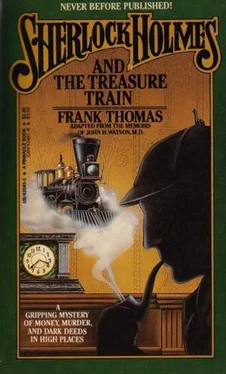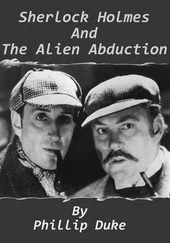After the departure of Claymore Frisbee, Holmes was at the desk, a sheaf of foolscap at his elbow and a quill pen in his hand. I knew that Billy would be summoned shortly and dispatched to the cable office with communiqués, and throughout London, and in other places as well, the machinery of the great sleuth would grind into action.
Prior to dinner, he revealed some of the thoughts coursing through his superb mind. This delighted me, since it was not a customary procedure so early in the game. It crossed my mind that the bullion robbery being a major coup of the lawless, Holmes must have anticipated being drawn into it. Perhaps he was already more au courant with the matter than I had thought, and indeed, he might have made some plans as to his initial moves before the summons from the B & N Railroad or the entrance of the Inter-Ocean Trust upon the scene.
"Our first step, I fear, will be in a fruitless direction," he stated with a wry smile. "No matter, we must make it."
"Where is the gold?"
He threw me a surprised glance. "Quite right. The raison d'être of the robbery is no small matter, and one does not just toddle around town with that much precious metal in one's pocket. It has to be stored somewhere."
"Your thoughts being that the gold might guild the path to the culprits."
Again he registered faint surprise. "Right on, old chap. What other thoughts do you have in mind?"
It was my turn to be surprised. Usually Holmes revealed his ideas almost as though speaking to himself. My questions and comments were the rhythm background to his analytic violins, a leitmotif of the Holmes symphony. Now, with the baton thrust into my hand, I was at a momentary loss but determined to wave it in some direction if only to make my presence known.
"We are not wanting for a motive," I said. "Greed inspired by the rare substance that has driven men to desperate deeds throughout history."
"Or need," responded Holmes dreamily. "A beggar might purloin a shilling for fish and chips and a night's lodging, whereas one higher on the social ladder, beset by obligations he cannot meet, risks disgrace for a greater sum."
"The motive being the same despite the difference in the value of the stolen object," I echoed.
"Exactly. Please continue, Watson."
Drat it , I thought. The ball is back in my court.
"You mentioned, Holmes, how well the robbery had been planned. Does that not indicate a knowledge of the terrain and of railway procedure?"
"A shrewd thrust, that last part."
"Not too revealing, however. Any number of people could have a working knowledge of the B & N."
"'Twould not suffice. It was a special train that was attacked and it ran on a schedule created for it. Normal procedure had little to do with the bullion carrier."
He had me there and I thought furiously. "Isn't a key problem the means by which the thieves got on the train? A lot of thought had gone into preventing just that from happening."
"Considering that our problem involves a train, I will resist the impulse to say that you are on the right track, old fellow."
Encouraged, a thought came to me. "Let us assume that the riflemen guards were not part and parcel of the plot."
"I'll accept that."
"Then once the freight achieved running speed, it would seem more than difficult to get aboard."
"Agreed."
"Then the thieves rode with it from the start."
"Not an unwieldy theory at all. Really, Watson, you have developed the ratiocinating mind through our long association."
This being rare praise indeed from Holmes, I plunged ahead. "Is there not an expression common in America, 'riding the rods'?"
"Relates to traveling hobos."
"Quite. Could not the two men you picture have been hidden under the boxcar before the engine assumed motion?"
"A possibility. How they would manage to crawl from their place of concealment and gain the roof eludes me, but the inventiveness of the homo sapiens is limitless."
"The only other thought that comes to mind is that the thieves hid themselves within the boxcar, but that idea is self-defeating as they would have been unable to get out of the securely locked carrier."
"Your first thought is the one that will bear investigation, good fellow."
At this point Mrs. Hudson made her presence known. It was time for dinner. This was the day of a most important social gathering, the meeting of the Marylebone Sewing Circle. While the event did not warrant a squib in the Evening Chronicle , it was dear to our landlady's heart. To make amends for her absence from the premises, Mrs. Hudson fairly outdid herself. We were served consommé Marie Stuart and filets de sole Carlton . Then we had thick mutton chops, their ends curled around a broiled kidney and affixed with a toothpick. This led my mind to the subject of claret and I brought forth a bottle of Château Lafitte '68, which I had been saving. By the time we dealt with a toothsome soufflé aux pêches à 1'Orientale , the evening, in my mind, was a merry occasion indeed.
Following our repast, it was my thought to peruse an article in the latest Lancet , but I soon found myself nodding over the medical journal. With apologies to Holmes, I soon made my way to bed and promptly fell into a deep sleep. On this night, with a nod no doubt to the Château Lafitte, bottled on the estate, I had no dreams of great trains hurtling through the night to their doom. The next thing I knew there was a shaking of my shoulder. As my eyes reluctantly blinked open, I beheld Sherlock Holmes leaning over my bed with a half smile on his lips. It was a new day.
"Come, old chap, if you would be part of the opening act of this drama we have become entangled in."
Despite a delightful lassitude, the coldness of the room and the floorboards, and the reticence of protesting bones to assume motion, I mumbled something to my intimate friend and made haste to perform my morning ablutions and struggle into clothes. In our sitting room, the smell of Holmes' pipe was everywhere. I gave it scant heed as I eagerly seized the cup of coffee he poured from the great silver urn and then applied myself to that mainstay of the empire, a stout English breakfast. The sleuth might have been up all night for all I knew, though I noted no clues as to the presence of others. As I wolfed kippers and eggs, he was going over a sheaf of papers that had the appearance of a business report.
When I poured myself a second cup of coffee and ignited a morning cigarette, Holmes tossed the document on the desk surface and joined me.
"My brother is a most meticulous man," he commented, "and despite his bulk, fast-moving. I cabled him last night for a report on recent transactions on the gold market, and early this morning a complete dossier came to our doorstep. I sometimes wonder when he sleeps."
"A thought that has bothered me at times relative to you," I replied, downing the last of my repast.
"The normal human requires sleep to oil the mechanism and food to fuel it, old friend," stated Holmes. "A thinking machine does not operate in that fashion."
Holmes often declared that he was a walking brain, since thinking was his sole reason for being, and I humored him by pretending acceptance. The fact that he was a superb fencer and the finest amateur boxer I had ever seen prompted me to adopt a different view, though I was the first to agree that he wasn't normal.
He did not seem disposed to divulge any results of the past evening, so I posed an obvious question. "What move do you plan now?"
"We meet with that Ledger chap at the B & N freight yard in half an hour, Watson. The gold train is there, and possibly we will find clues, to buttress your theory of robbers 'riding the rods'."
Читать дальше












